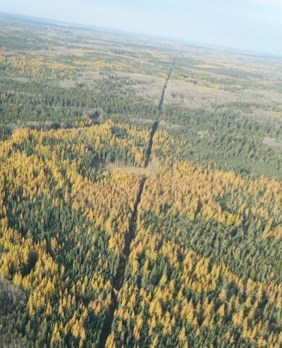Cenovus will be spending the next decade working to restore the caribou population in northeastern Alberta, particularly the Cold Lake herd.
It was announced last week that $32-million will be put towards the company's 10-year Caribou Habitat Restoration Project.
Treating an area of approximately 3,900-sq km, the project will be the largest single area of caribou habitat restoration in the world.
“At Cenovus, we've been working on cutting-edge caribou habitat restoration for several years,” said Jon Mitchell, vice president of environment and sustainability. “Today, we're taking our voluntary efforts to a whole new level with this ambitious project to restore the fragmented boreal forest in an area that is home to the Cold Lake caribou herd. While much needs to be done to support caribou recovery, we believe our project will contribute significantly to the provincial government's developing caribou action and range plans.”
The announcement comes upon the completion of a three year pilot project. Starting in 2013, Cenovus worked to restore the caribou habitat on the Cold Lake Air Weapons Range.
The Cold Lake caribou herd is estimated at approximately 150 animals, but the herd is declining. Their estimated habitat range is around 6,700-sq km, including parts of CLAWR where the Foster Creek oil sands is located.
At a cost of approximately $7.5 million, from 2011 to 2015 the company treated around 240 km of old seismic line and planted about 270,000 tree seedlings.
This 10-year project will expand on that success. Between now and 2026, workers will treat approximately 3,500 km of old seismic lines, access roads, and other linear disturbances. Around four million tree seedlings are expected to be planted.
“We can achieve a healthy environment and a prosperous economy but it requires leadership. Cenovus yet again is showing that leadership with their commitment today. This is a remarkable development for boreal caribou. We welcome it and Cenovus' commitment to work collaboratively with others, including Canadian Boreal Forest Agreement signatories, toward a comprehensive solution for the Cold Lake range as a whole,” explained Aran O'Carroll, executive director of the Canadian Boreal Forest Agreement.
Woodland caribou are listed as threatened under the federal Species at Risk Act (SARA). Under SARA, the federal government requires provinces with caribou populations to put action and range plans for caribou recovery in place by October 2017.
Cenovus' restoration techniques including mounding the soil in swampy areas to create drier conditions for trees to grow, adding woody debris and leaning tree stems into disturbed pathways to discourage caribou from using these corridors for travel, and tree planting. Devon, Imperial Oil, and Canadian Natural have contributed a portion of the funding for restoration work in 2016.
Since the completion of the three-year pilot program, initial results have already been seen from monitoring. According to officials with Cenovus, the data is consistent with reduced wolf and caribou movement and improved tree growth in treated areas.
Moving forward, Cenovus plans to collect data on vegetation growth, as well as moose, bear, caribou, and wolf movements to assess the overall impact of the restoration. Once the full restoration project is complete in 2026, initiatives will likely need to proceed to support the stabilization and continued growth of the local caribou population.



